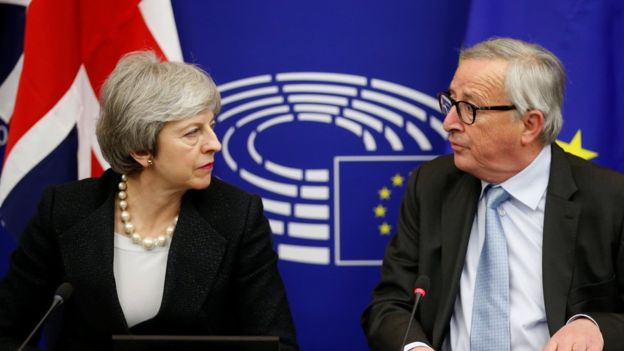
Theresa May says she has secured “legally binding” changes to her Brexit deal, a day ahead of MPs voting on it.
But European Commission President Jean-Claude Juncker warned if the deal was voted down there was “no third chance”.
They spoke at a joint press conference in Strasbourg after a late meeting.
Labour leader Jeremy Corbyn said the prime minister’s negotiations had “failed” and the announcements did not contain “anything approaching the changes” she had promised Parliament.
Cabinet Office Minister David Lidington announced the changes to the Commons shortly before the press conference, saying they would mean the EU “cannot try to trap the UK in the [Irish] backstop indefinitely”.
Mrs May confirmed she would be opening the debate on Tuesday ahead of a so-called “meaningful vote” on her deal, which must be agreed by Parliament to come into force.
Last time her deal was put to Parliament in January, she suffered an historic loss as it was voted down by a margin of 230.
The PM also said her attorney general, Geoffrey Cox, would publish his legal advice on the changes to the deal before the vote.
By BBC political editor Laura Kuenssberg
Monday morning government blues have been replaced by Tuesday morning nervous hopes.
The government does not suddenly expect its Brexit deal to be ushered through at speed, cheered on by well-wishers.
It does, however, believe that Monday night’s double act in Strasbourg by Theresa May and Jean Claude Juncker puts it, to quote one cabinet minister, “back in the races”.
The extra assurances wrought from weeks of talks with the EU will move some of the prime minister’s objectors from the “no” column to the “yes”.
…………………………………………………………………………….
Mrs May flew out to the European Parliament late on Monday with her Brexit Secretary Steve Barclay for last-ditch talks ahead of the vote.
In the discussions with Mr Juncker and the EU’s chief Brexit negotiator Michel Barnier, two documents were agreed by all parties, which Mr Lidington said would “strengthen and improve” both the withdrawal agreement from the EU and the political declaration on the future relationship.
The first is a “joint legally binding instrument” on the withdrawal agreement.
Mrs May said it could be used to start a “formal dispute” against the EU if it tried to keep the UK tied into the backstop – the safety net designed to maintain an open border on the island of Ireland – indefinitely.
The backstop has been criticised by some who believe it will keep the UK tied to the EU indefinitely, but the bloc has said “if used [it] will apply temporarily”.
The second is a “joint statement” adding to the political declaration – the statement in the deal about the UK and EU’s future relationship – to commit to replacing the backstop with alternative arrangements by December 2020.
Another document will also be put forward by the government, known as a “unilateral declaration”.
The PM said this would outline the UK’s position that there was nothing to prevent it from leaving the backstop arrangement if discussions on a future relationship with the EU break down and there is no prospect on an agreement.
Mrs May said: “MPs were clear that legal changes were needed to the backstop. Today we have secured legal changes.
“Now is the time to come together to back this improved Brexit deal and deliver on the instruction of the British people.”
Mr Juncker also warned MPs that they would be putting everything at risk if they voted down the deal.
“In politics sometimes you get a second chance,” he said.
“It is what we do with that second chance that counts. There will be no third chance.”
He added: “Let us speak crystal clear about the choice – it is this deal or Brexit might not happen at all.”
Labour leader Mr Corbyn urged MPs to vote against the deal when it returns to the Commons on Tuesday.
“Since her Brexit deal was so overwhelmingly rejected, the prime minister has recklessly run down the clock, failed to effectively negotiate with the EU and refused to find common ground for a deal Parliament could support,” he added.
The Conservatives’ partner in Parliament, the DUP, have been outspoken critics of the deal – especially the backstop.
After the announcement, a spokesman said: “These publications need careful analysis. We will be taking appropriate advice, scrutinising the text line by line and forming our own judgement.”